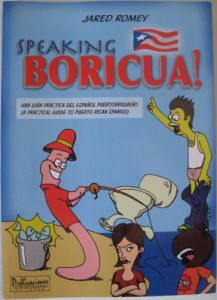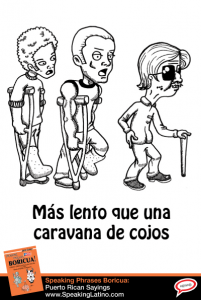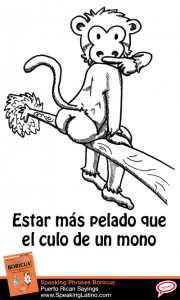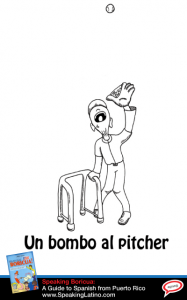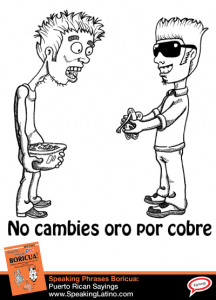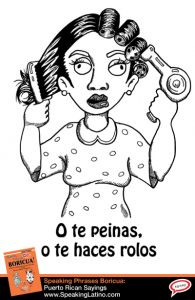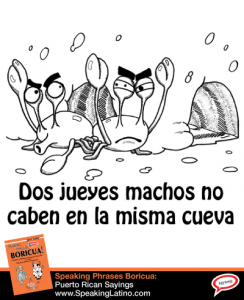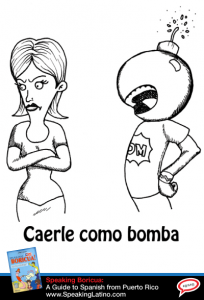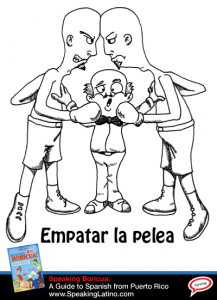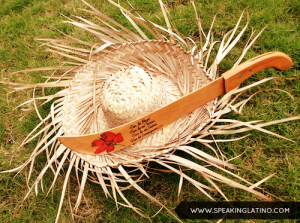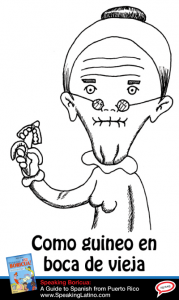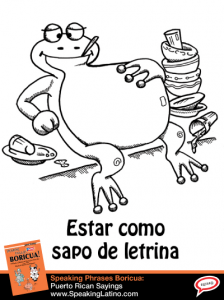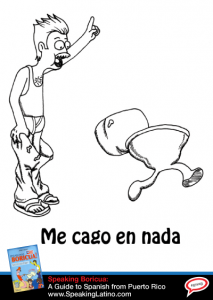My mom sent me this video recently. These are the 6-years-old vloggers Andres and Lucas showing us a great sample of Puerto Rican Spanish words. Irresistible to watch! The Puerto Rican Spanish words and phrases featured are: jincho: fair skin zafacón: trash can al garete: without direction jicotea: turtle mapo: mop jugo de china: orange juice ¡Qué jartera!: so stuffed (of food) […]
VIDEO: List of Spanish Slang Expressions About Money Used in Puerto Rico
Before you even step into a new country, money is one of the first topics you will become involved in. How much does my trip cost? How much money should I take? Will my ATM (otherwise known as ATH in Puerto Rico) card work? This video will have you prepped and ready to go for […]
Why I Wrote Speaking Phrases Boricua
Read what inspired Jared Romey to write the book Speaking Phrases Boricua – Refranes de Puerto Rico about Puerto Rican sayings,
MÁS LENTO QUE UNA CARAVANA DE COJOS: Puerto Rican Spanish Saying
Here you have an illustration of the Puerto Rican Spanish saying más lento que una caravana de cojos. This illustration is included in the book Speaking Phrases Boricua. MÁS LENTO QUE UNA CARAVANA DE COJOS: Puerto Rican Spanish Saying • Literal translation: Slower than a caravan of cripples • Meaning: Extremely slow • Example: “Las […]
MÁS PELADO QUE CULO DE MONO: Puerto Rican Spanish Expression
Here is an illustration of the Puerto Rican Spanish expression estar más pelado que culo de mono. This illustration is featured in the book Speaking Phrases Boricua. Puerto Rican Spanish Expression: Más pelado que culo de mono • Literal translation: To be balder than a monkey’s ass • Meaning: broke, penniless, with no money. The […]
UN BOMBITO AL PITCHER: Puerto Rican Spanish Expression
Here is an illustration of the Puerto Rican Spanish expression un bombo al pitcher or un bombito al pitcher. It is featured in the book Speaking Boricua. Puerto Rican Spanish Expression: Un bombito al pitcher • Literal translation: An easy-to-catch ball for the pitcher • Meaning: something really easy to do, a “freebee.” The word […]
NO CAMBIES ORO POR COBRE: Puerto Rican Spanish Saying
Here is an illustration of the Puerto Rican Spanish saying no cambies oro por cobre from the book Speaking Phrases Boricua. Puerto Rican Spanish Saying: No cambies oro por cobre • Literal translation: Do not change gold for copper • Meaning: Advice to avoid changing something of value for something else of less value. • […]
O TE PEINAS O TE HACES ROLOS: Puerto Rican Spanish Saying
Here is an illustration of a common Puerto Rican Spanish saying: o te peinas, o te haces rolos. This phrase also have the variation o te peinas o te haces papelillos. Puerto Rican Spanish Saying: O te peinas, o te haces rolos • Literal translation: Either you brush your hair or you curl it Or […]
DOS JUEYES MACHOS NO CABEN EN LA MISMA CUEVA: Puerto Rican Spanish Saying
Here is an illustration of a common Puerto Rican Spanish saying: dos jueyes machos no caben en la misma cueva. You might also hear the variation dos jueyes machos no caben en la misma jaula. Spanish Saying from Puerto Rico: Dos jueyes machos no caben en la misma cueva • Literal Translation: Two male crabs […]
Puerto Rican Spanish Phrase: CAER COMO BOMBA
Here is another Puerto Rican Spanish phrase commonly used on the island: caer como bomba. This illustration is featured in the book Speaking Boricua that you can preview here. Puerto Rican Spanish Phrase: CAERLE COMO BOMBA • Literal translation: like a bomb • Meaning: to not go over well, to not get along with; not […]
EMPATAR LA PELEA: Puerto Rican Spanish Expression
Have you ever heard the phrase empatar la pelea? This is a common Puerto Rican Spanish expression and I have an illustration of it in my book Speaking Boricua: Puerto Rican Spanish Expression: EMPATAR LA PELEA • Literal translation: to tie the fight • Meaning: to make ends meet • Example: “Gracias a Dios que […]
VIDEO: Puerto Rican Spanish Slang and Colloquial Spanish Expressions
There is no better way to describe Puerto Ricans that by using our own words. Recently I ran across a copy of an old email chain (of the era when Facebook did not exist) with a lot of Puerto Rican Spanish slang and colloquial Spanish words that describe us. The text of the email was […]
COMO GUINEO EN BOCA DE VIEJA: Puerto Rican Spanish Street Slang Phrase
One of the most hilarious Spanish street slang phrases used in Puerto Rico is como guineo en boca de vieja. This Puerto Rican Spanish expression literally translates to “like a banana in an old lady’s mouth” and means “to pass easily without force.” When using this phrase it needs to be preceded by a verb, […]
COMO SAPO DE LETRINA: Puerto Rican Spanish Slang Expression
If you happen to visit Puerto Rico, you surely will try some of the local food. And at some point, I guarantee that you will overeat mofongo, rice and beans or one of the many fried foods. At that point you will need a local phrase to express how you feel, and that phrase is: […]
ME CAGO EN NA: Puerto Rican Spanish Slang Expression
The Puerto Rican Spanish slang expression me cago en ná (pronounced me ca we ná) is one of the most common swear phrases you will hear from the mouths of locals. Me cago en ná is the colloquial pronunciation of me cago en nada and it’s a mild expression that means “dam!” or “shit!” Puerto […]
Las palabras, como las plumas, se las lleva el viento
A proverbial phrase that translates to 'Words, like feathers, are carried away by the wind.' It means that promises and words are easily said but often forgotten or not followed through. Examples Spanish: 'Me prometiste que me ayudarías con mi proyecto, pero ya veo que las palabras, como las plumas, se las lleva el viento.' […]
Las estrellas inclinan, pero no obligan
This phrase translates to 'The stars incline, they do not oblige'. It is a popular saying in Spanish that means while destiny or fate may influence our lives, they don't determine them completely. We still have the power to make our own choices and change our lives. Examples Spanish: Recuerda, las estrellas inclinan, pero no […]
Las doce, la que tenga a mi novio que no lo goce
A playful phrase used often among girls and women which translates to 'At twelve, whoever has my boyfriend should not enjoy it.' It's typically said in a joking manner to express a kind of territorial claim over a boyfriend, particularly at parties or social gatherings where the boyfriend might be present without them. Examples Spanish: […]
Las desgracias no vienen solas
This phrase translates to 'misfortunes never come singly' in English. It implies that bad things tend to happen all at once or one after another, rather than in isolation. Examples Spanish: Perdió su trabajo, su coche se averió y su novia lo dejó. Como dice el dicho, las desgracias no vienen solas. English: He lost […]
Las cosas se toman según de quien vengan
This phrase translates to 'Things are taken depending on who they come from.' It is used to indicate that the way we perceive actions or words can greatly depend on who they come from. For instance, a comment might be taken as a joke if it comes from a friend, but as an offense if […]
Las cosas se caen por su propio peso
This phrase is used to express the idea that the truth always comes out in the end, or that things have a way of settling themselves naturally. It's similar to the English idiom 'the truth will out' or 'what goes around comes around'. Examples Spanish: No te preocupes por demostrar que tienes razón. Las cosas […]
Las apariencias engañan
The phrase 'Las apariencias engañan' is not actually slang, but a common phrase. It translates to 'appearances can be deceiving' in English, suggesting that things may not always be as they seem. Examples Spanish: Parece una persona amable, pero recuerda que las apariencias engañan. English: He seems like a nice person, but remember that appearances […]
Las aguas siempre vuelven a su nivel
This phrase is used to convey the idea that everything returns to its original state or place. It's often used in the context of relationships, implying that people will eventually find their way back to those who are similar to them in character or status. Examples Spanish: 'Las aguas siempre vuelven a su nivel', dijo […]
Ladrón que roba a ladrón, merece el perdón
This phrase is not exactly slang, but a popular saying in Spanish. It literally translates to 'A thief who steals from another thief deserves forgiveness'. It is used to express the idea that if a person does wrong to someone who also does wrong, the action can be justified or is less severe. Examples Spanish: […]
La venganza nunca es buena, mata el alma y la envenena
This is a proverb that translates to 'Revenge is never good, it kills the soul and poisons it.' It is used to express the idea that seeking revenge only leads to more harm than good, fostering negativity and bitterness. Examples Spanish: Después de lo que hizo, entiendo que estés enfadado, pero recuerda que 'La venganza […]
La última la paga el diablo
A Spanish slang phrase that is used to express that the last person or thing to arrive is responsible for a certain task or consequence. It is often used in social settings, such as when a group of friends is ordering drinks, the person who orders last might have to pay for all of them. […]
La tercera es la vencida
This phrase literally translates to 'the third one is the charmed.' It is used to express the belief that the third attempt at doing something will be successful, after two unsuccessful attempts. Similar to the English saying 'third time's the charm.' Examples Spanish: He fallado dos veces al intentar hacer una tarta, pero la tercera […]
La suerte de la fea la bonita la desea
A popular Spanish phrase that translates to 'The luck of the ugly woman is something the beautiful woman desires.' It implies that physical beauty doesn't guarantee happiness or good fortune, and those considered less attractive may have qualities or luck that those considered beautiful may envy. Examples Spanish: Ana siempre consigue los mejores trabajos y […]
La soga rompe por lo más delgado
This phrase is equivalent to the English saying 'the straw that broke the camel's back.' It is used to express that the weakest part is the first to break or give way under pressure, often used in situations where a small or seemingly insignificant issue is the final test of patience or endurance. Examples Spanish: […]
Los trapos sucios se lavan en casa
This phrase literally translates to 'dirty clothes are washed at home'. It is used to imply that family issues or personal problems should be dealt with privately and not discussed or aired in public. Examples Spanish: No deberías haber comentado nada sobre nuestra pelea en la fiesta. Recuerda que los trapos sucios se lavan en […]

